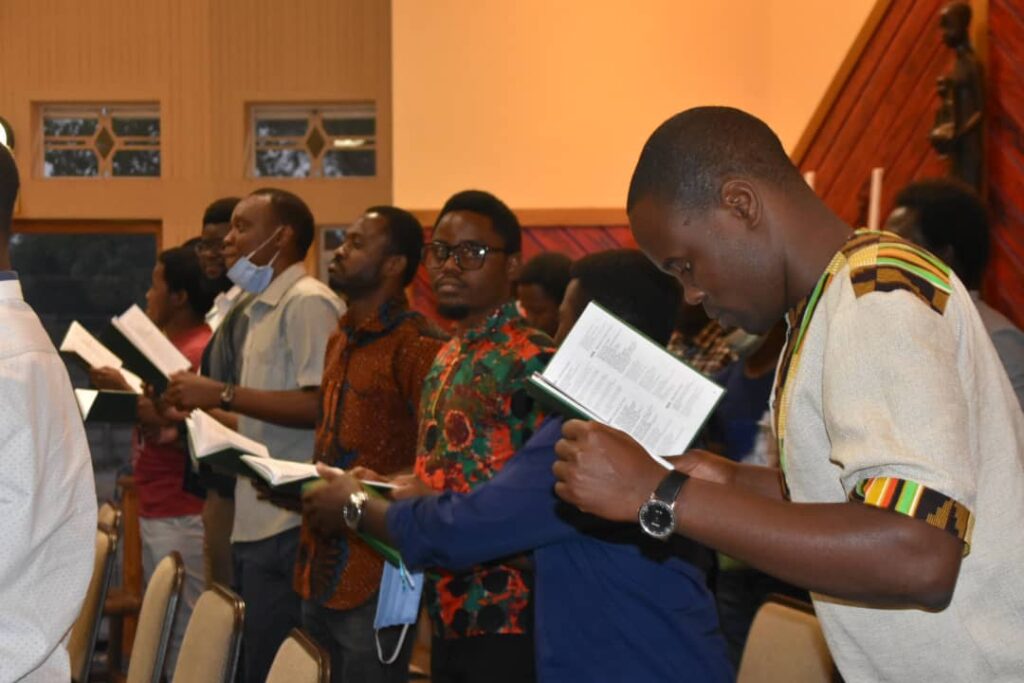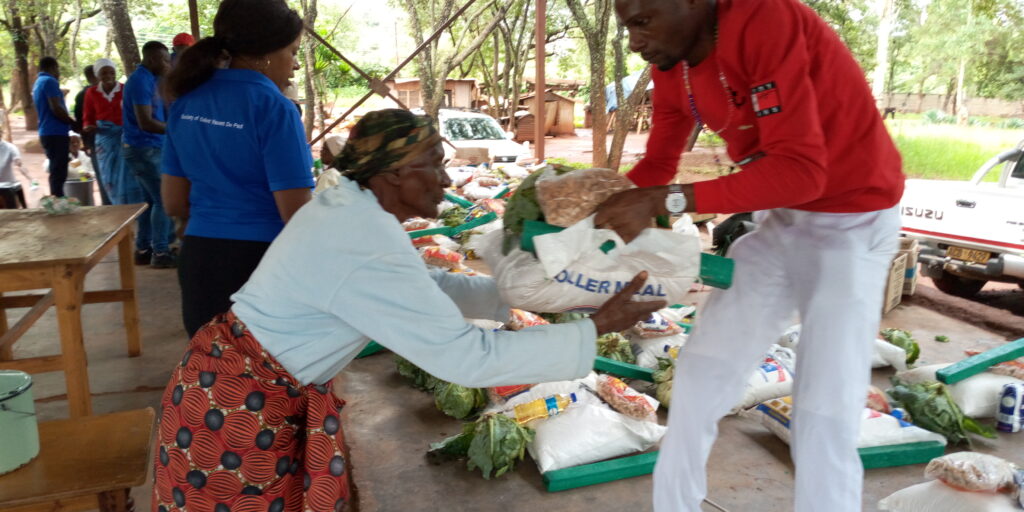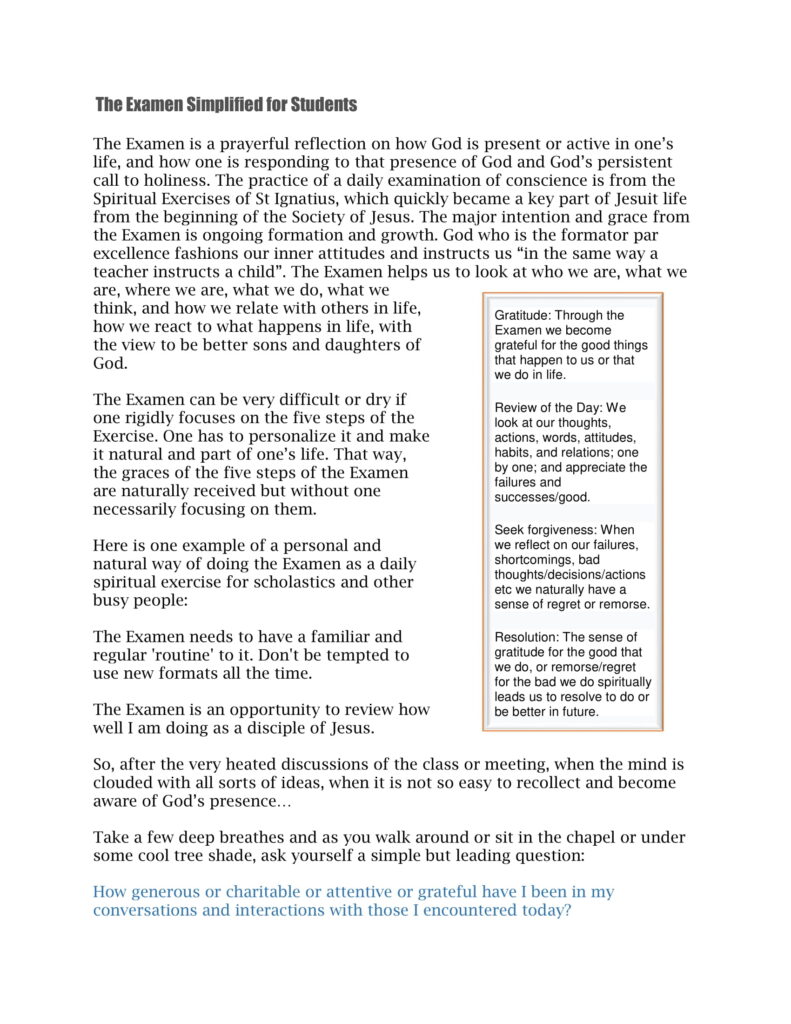

The joy of the Lord is our strength Nehemiah 8 : 10
Spiritual Life at AJU
SPIRITUAL LIFE AT AJU.
As a Jesuit University, AJU is obviously Christian. After all, ‘Jesuit’ means a member of the Society of Jesus. Hence spirituality plays a fundamental role in the life of Arrupe Jesuit University. This spirituality is fostered in different ways. Among them are:
- PRAYER AND WORSHIP.
Spirituality is about discovering the spirit of God at the centre of our being, experiencing it, establishing a relationship with it, or ‘falling in love with it’, to use the words of Pedro Arrupe, and living our lives out of it. This transforms us into Godlike and Christlike people.
Prayer is an essential way to this. As a university, most of whose students are Jesuits, as well as members of other Religious Congregations, and Christian lay students, personal prayer is an essential part of every student’s daily life. As well as this, there is common prayer, mainly in the form of celebrating the Eucharist daily in small communities, and once a week in the large Arrupe community. This is what binds us together and provides us with the energy and zeal to carry out our various works. For Jesuits, and members of other congregations, there are monthly days of recollection, triduums during Advent and Easter, and annual eight-day retreats. This all to keep the fire of God’s love burning within us.
SPIRITUAL STUDY.
- Students
In Shona we say ‘kudzidza hakuperi’ (learning never ends). This certainly pertains to our knowledge of, and relationship to, God who is infinite. So, a one-year (two-part) elective on Ignatian Spirituality is offered to students to help them delve ever deeper into the world of spirituality. It is a required course for Jesuits. The first semester looks at the theoretical side, trying to contextualize it in our African and global situations. The second semester deals with the practical side of Ignatian Spirituality. How do we practice it, live it, and give it to others?
Jesuit spirituality insists on collaboration with our lay partners. We are all on a common mission, driven by a joint Ignatian spirituality. To foster knowledge and practice of this spirituality, we have an Ignatian Identity Program for lay staff. We go away to learn about Ignatian Spirituality, reflect and pray about what it means to us personally and as members of our university, and on how to make Arrupe live up to its name of being a Jesuit university.
- Outside Lay Students.
A two, or three, semester diploma in Ignatian Spirituality is offered to outsiders. It is well attended and much appreciated. Apart from learning about the nature of spirituality, part of the course involves a six-week Ignatian retreat in daily life. Each student has a director to guide him/her on the retreat journey.
SPIRITUAL PRACTICE.
As already mentioned, the second semester of the spirituality course deals with the practice of Ignatian Spirituality. How do we practise Ignatian Prayer, get guidance from spiritual direction, make Ignatian retreats, discern the will of God, and make important life decision on the basis of this discernment?
Students are also taught how to hand on these treasures to others. They learn how to give spiritual direction through role plays. And they give retreats in daily life during Lent.
SERVICE PROGRAMS (APOSTOLATES).
It has already been mentioned that Ignatian Spirituality is essentially a service spirituality, and what AJU is doing to carry out these services for the poor. In a nutshell, these are the main spiritual activities carried out at AJU.

SOCIAL PROGRAMS (APOSTOLATES) AT AJU.
The motto of Arrupe Jesuit University is ‘Ever to Love and Serve’. And, as a Jesuit University, following Ignatian Spirituality which is essentially a service spiritualty, AJU is committed to reaching out to society, especially the poor, to do what it can to reduce their plight and accord them the dignity they deserve as humans made in the image and likeness of God. Jesuit education is not just about excelling in academics, but about developing the whole person. This includes the social, moral and spiritual dimensions.
To this effect, every student is obliged to engage in a service program or apostolate. These involve a large variety of programs in support of disadvantaged people. For example:
AJU students go out to High Density Suburbs to assist students through teaching, mentoring, and encouraging them. For instance, at St. Peter’s Mbare, Tichakunda (Hatcliffe Extension), and St. Peter’s Kubatana in Highfield.
The AIME (Australian Indigenous Mentoring Experience) helps school student through mentoring and enabling them to realise their dreams for the future. AJU works in partnership on this program with the Catholic University, Holy Trinity College, and soon with the Regional Seminary at Chishawasha.
- Food distribution. AJU’s ‘Solidarity with the Poor Committee’ adopts projects to support the poor, each Advent and Lent. At present we work in partnership with the SSVP’s (Society of St. Vincent de Paul) in Mbare and Mt. Pleasant, to distribute food to hungry people, of whom there are many in these difficult days of Covid-19. We have also built classrooms for a community school for squatter children in Hatcliffe Extension.
- AJU students work with ‘Street Kids’ at Zambuko House, handicapped at L’Arche, orphans at ‘Shungu Dzevana’, destitute, at the Mother Theresa home in Ardbennie, trafficked people in conjunction with AFCAST.
- In these harsh economic times, people’s spirits can be low. They feel helpless and dejected. AJU students reach out to them with prayer, spiritual conversation and counselling, and catechetical teaching at the University of Zimbabwe, the CLC (Christian Life Communities) and various parishes.
- Some students work with the Catholic Justice and Peace Commission to help identity the structural causes of poverty and suffering, and to advocate against them by teaching, discussion, writing etc.
These are some of the social activities undertaken by AJU students in their service programs. The programs nourish the students through the joy they derive from reaching out to others, and helping them improve their lives. And it provides love and support to the beneficiaries. They feel someone cares, and that they matter. This is a big boon for them.




THE EXAMEN



